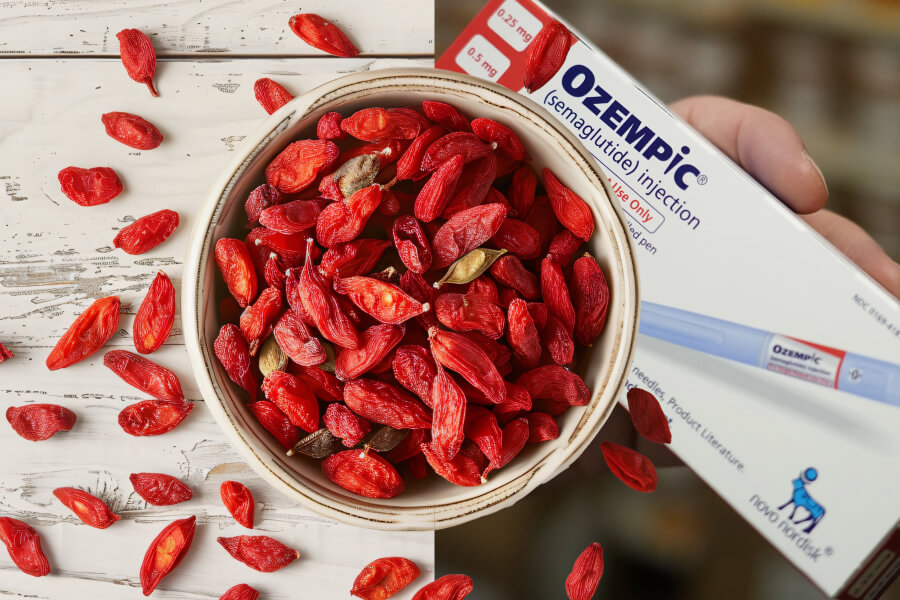In recent years, berberine, a natural compound found in various plants, has gained popularity for its potential health benefits, particularly for managing blood sugar and promoting weight loss.
On the other hand, Ozempic, a prescription medication commonly used to treat type 2 diabetes, has been hailed as a powerful tool for weight management and glycemic control. But can berberine truly replace Ozempic?
We can know the answer by exploring the similarities, differences, effectiveness, and safety of these two options to help you make an informed decision.
Berberine’s Potential as a Substitute for Ozempic
Berberine is a plant alkaloid found in several herbs, including Berberis, Goldenseal, and Oregon grape. It has been traditionally used in Chinese and Ayurvedic medicine for centuries. More recently, research has highlighted its ability to improve blood sugar control and aid in weight loss, leading some to wonder if it could serve as a natural alternative to Ozempic.
Ozempic (semaglutide) is a GLP-1 receptor agonist, primarily prescribed for type 2 diabetes management. It works by increasing insulin secretion, reducing appetite, and slowing down the digestive process, which helps regulate blood sugar levels and promote weight loss. But can these same effects be achieved with berberine?
Exploring the Similarities and Differences
Effectiveness in Managing Blood Sugar Levels
Both berberine and Ozempic have shown promising results when it comes to blood sugar management, but they work in different ways:
Berberine activates AMPK (adenosine monophosphate-activated protein kinase), an enzyme that plays a key role in regulating metabolism and insulin sensitivity. It helps reduce glucose production in the liver and improves the body’s use of sugar, making it a potential aid for those with type 2 diabetes.
Ozempic, on the other hand, mimics the GLP-1 hormone, which helps the body produce more insulin when needed and slows digestion to prevent rapid blood sugar spikes. This makes it highly effective for stabilizing blood glucose levels.
While both can be effective for controlling blood sugar, studies show that Ozempic tends to be more potent and consistent, especially for individuals with more advanced diabetes.
Potential Benefits for Weight Loss
Berberine has been linked to modest weight loss, largely due to its impact on improving insulin sensitivity and fat metabolism. Some studies suggest that it may reduce body weight by about 2-5 kg over several months.
Ozempic, however, has become famous for its significant impact on weight loss. Clinical trials have shown that patients using Ozempic can lose up to 10-15% of their body weight, making it a popular choice for individuals seeking substantial weight reduction.
In terms of weight loss potential, Ozempic outperforms berberine, but berberine could still be a good option for those looking for a more gradual and natural approach.
Assessing Safety Concerns and Risks
When comparing the safety of berberine and Ozempic, it’s essential to weigh the risks and side effects associated with each.
Berberine is generally well-tolerated, but it can cause some gastrointestinal issues, such as diarrhea, constipation, or stomach cramps, especially when taken in high doses. It’s also important to note that berberine can interact with certain medications, including those for blood pressure and blood sugar, so always consult with a healthcare provider before starting it.
Ozempic is a prescription medication with its own set of side effects, including nausea, vomiting, diarrhea, and in rare cases, pancreatitis. Additionally, long-term use of Ozempic has been associated with thyroid tumors in animal studies, though the risk in humans remains unclear.
Overall, berberine may have a better safety profile for those looking for a natural option, but Ozempic offers more robust effects for both blood sugar control and weight loss albeit with some potential risks.
Optimizing Berberine Usage for Maximum Results
Recommended Dosage and Administration
The optimal dosage of berberine for blood sugar control and weight loss is typically around 500 mg taken 2-3 times a day, preferably before meals. It’s important to start with a lower dose to assess tolerance and avoid gastrointestinal issues.
Combining Berberine and Ozempic: Feasibility and Risks
For those considering combining berberine with Ozempic, it’s essential to consult with a healthcare professional. While berberine may offer additional metabolic benefits, combining it with prescription medications can increase the risk of hypoglycemia (low blood sugar) or other adverse effects.
Uncovering Additional Health Benefits of Berberine
- Heart Health: Some research suggests that berberine can help lower cholesterol levels, improve triglycerides, and reduce the risk of heart disease.
- Metabolic Health: Berberine may also support liver function and reduce fat accumulation in the liver, which could be beneficial for those with metabolic syndrome or fatty liver disease.
Addressing Controversies and Misconceptions
While berberine has earned the nickname of “Nature’s Ozempic,” it’s essential to approach this comparison with caution. Berberine offers some similar benefits, but its effects are typically milder and take longer to achieve. Ozempic, being a pharmaceutical-grade medication, delivers faster, more significant results, particularly for individuals with type 2 diabetes and those struggling with obesity.
Gaining Insights from Health Professionals
Healthcare experts often recommend berberine as a complementary supplement for individuals looking to improve insulin sensitivity and lose weight. However, it’s not seen as a direct replacement for Ozempic. Always consult with a doctor to determine the best approach for your health needs.
Conclusion
In conclusion, while berberine offers some promising benefits for managing blood sugar and promoting weight loss, it’s not a direct substitute for Ozempic. For those seeking a natural approach or complementary support, berberine can be a helpful tool. However, Ozempic remains the more potent option, particularly for individuals with type 2 diabetes or those needing significant weight loss.
If you’re considering using berberine as part of your health routine, it’s essential to discuss your options with a healthcare provider to ensure it’s safe and effective for your specific needs.
FAQs
Does Berberine work as well as Ozempic?
Berberine has shown promise in managing blood sugar, but it’s not as potent as Ozempic, which is designed for more advanced cases of diabetes and significant weight loss.
What is a natural supplement to replace Ozempic?
While berberine is often touted as a natural alternative, it’s best seen as a complementary option rather than a full replacement.
Does berberine get rid of fat?
Berberine may help reduce body fat by improving insulin sensitivity and metabolism, but its effects are usually modest. It’s not a quick fix and works best alongside diet and exercise.
How quickly do you lose weight with berberine?
Weight loss with berberine is generally more gradual, with modest reductions over several months, typically around 2-5 kg.







